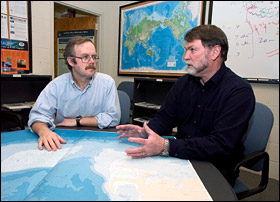
|
 |
Research > Centers
> Cooperative Institute for Climate and Ocean Research
Cooperative Institute for Climate and Ocean Research
 |
 |
| CICOR Director
Bob Weller (left) and scientist Peter Wiebe of the Biology
Department review a chart of Georges Bank, a fishery being
studied by oceanographers addressing climate change with
the GLOBEC project. (Photo by Tom Kleindinst) |
The Cooperative Institute for Climate and Ocean Research (CICOR) coordinates and fosters interaction between WHOI and the National Oceanic and Atmospheric Administration (NOAA). CICOR administers NOAA-funded research,
builds ties between researchers at WHOI and NOAA, and carries out outreach and education activities.
The Institute is one of 13 such joint institutes operating in 12 states.
Research themes at CICOR focus on climate, marine
ecosystems, and coastal ocean research. Nineteen new and ongoing projects within these themes were funded in 2003, bringing the total to 45 projects. Funding for all projects in 2003 totaled $5 million.
Funding supported the continuing research of the Global Ocean Ecosystem Dynamics (GLOBEC) project, a group of oceanographers and fisheries specialists
addressing global climate change. Multiple efforts by WHOI scientists and their collaborators involved with GLOBEC centered on Georges Bank, a productive North Atlantic fishery stretching from New England to Nova Scotia.
Biologist Peter Wiebe, with others in the Biology and the Applied Ocean Physics and Engineering
departments, collaborated with more than a dozen investigators from five universities and the National Marine Fisheries Service in Woods Hole to synthesize
data about the distribution and abundance of the larvae and eggs of cod, haddock, and other
marine species on Georges Bank. Their goal is to
anticipate how these populations might respond to climate change.
Wiebe also worked with GLOBEC program members
on reports and an annual workshop to showcase data sets and modeling efforts at Georges Bank. They presented their results at the American Geophysical Union Ocean Sciences meeting in January 2004.
Robert Beardsley and others in the Physical Oceanography Department worked to describe fluctuations
in the currents and stratification on Georges Bank, including the tidal mixing front that develops over the top of the Bank during the summer. Their colleagues in the Marine Policy Center at WHOI, John Steele and Andrew Beet, conducted an analysis
of climate impacts on phytoplankton to see how changes in their productivity would affect fish stocks.
Two new postdoctoral scholars joined CICOR in 2003. Ruoying He studies ocean circulation, biophysical
interactions, air-sea interactions, numerical modeling,
and data assimilation. He is conducting research with Robert Beardsley in the Physical Oceanography Department and Dennis McGillicuddy in the Applied Ocean Physics and Engineering Department.
Nicholas Scott is working on statistical analyses of steep waves in open ocean waters for research with John Trowbridge and Jim Edson, both in the Applied Ocean Physics and Engineering Department.
—Robert Weller(rweller@whoi.edu)
Cooperative Institute for Climate and Ocean Research Director
|
|
